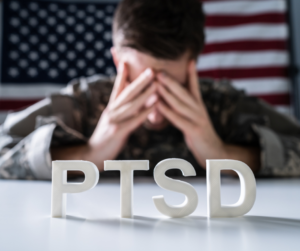Post-traumatic stress disorder (PTSD) is a mental health condition that can affect anyone who has experienced or witnessed a traumatic event. For veterans, the trauma of war and combat can lead to PTSD, which can have an immense impact on their day-to-day lives. In this blog post, we’ll explore what PTSD is and how it affects veterans.

What is PTSD?
PTSD is a type of anxiety disorder that develops after experiencing or witnessing a traumatic event. These events can include war, physical or sexual assault, accidents, injury, or even death. People with PTSD may experience flashbacks, nightmares, difficulty sleeping and concentrating, heightened startle response, irritability, depression and anxiety.
How Does PTSD Affect Veterans?
Veterans who suffer from PTSD often struggle to adjust to civilian life after leaving the military. The transition process can be long and difficult for some veterans as they reintegrate into society and their daily routines. For example, veterans may have difficulty adjusting to the changes in work schedules or managing interpersonal relationships with family members and friends who did not experience the same trauma as they did during their time in service. Additionally, many veterans are unable to access necessary mental health services due to lack of resources or fear of stigma associated with seeking help for mental health issues related to war and combat experiences.
Veterans also face unique challenges related to their particular branch of service and deployment locations that can further complicate the transition process upon return home. For example, some branches require longer deployments than others which may cause more strain on family relationships when returning home after extended periods away from loved ones. Moreover, certain deployments such as missions overseas require different levels of discipline due to security considerations which may make it difficult for some veterans adjust back into civilian life where there are fewer restrictions on behavior.
The effects of PTSD can be devastating for veterans returning home after serving in the military. It’s important to remember that seeking help is always an option if you feel like you need it – there are many resources available today specifically geared towards helping our nation’s heroes manage these difficult transitions back into civilian life and cope with symptoms related to post-traumatic stress disorder such as depression and anxiety. We should all take care of each other by listening closely when someone shares their story about their experiences abroad so we can better understand how best to support them during this challenging time in their lives. By providing support networks for veterans suffering from PTSD , we are helping them build healthier lives both inside and outside the military setting . If you know someone who is struggling with post traumatic stress disorder , please reach out today . You don’t have go through this alone . Together , we will get through this . 🇺🇸 💕 💪🏼 #veteranmentalhealthawarenessmonth #ptsd #mentalhealthmatters #supportourvets